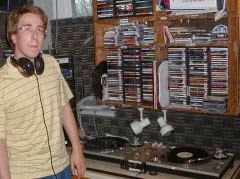artificial irrelevance
Electro-Clash Stakes it's Claim to KC ~ Story and Photos by Michael Bradshaw ~ Among heaps of cellophane-wrapped records that make up a collection of more than 3,000 pieces of vinyl, DJ Christopher Landis Shively balances on the hind legs of his desk chair and smiles wickedly under a pair of thick-rimmed glasses. Behind him, twin computer monitors glow next to an imposing stack of samplers, sequencers and drum machines. A pair of turntables flank the pile of flickering machines and are covered, like the rest of the rig, in hundreds of tiny stickers featuring Japanese cartoon characters.
Shively, 21, knows a lot about electronic music. At age sixteen, Shively entered the rave circuit DJing retro break beat and hardcore records to dance floors ten years his senior. Since then, he’s participated in a number of electronica-based club nights in Kansas City and recently put on a fashion show/ electro party in Lawrence called, “Robolust.” Presently, he’s the music director at KJHK, the University of Kansas’s student radio station in Lawrence and host of “Super Disco Gallactica”--a three hour, Friday night swim through obscure electro-pop, new-wave and house recordings from the late 70’s and 80’s.
At the station, Shively takes turns beat-mixing (making fluid, rhythmic transitions between songs by adjusting the tempo of the record), taking calls on the station’s request line and gobbling up a sandwich.
“I play pretty much any historically important electronic dance music.” Shively says with a grimace. “This show is all about the self-indulgent crap I couldn’t play out at a [show].”
Super Disco Gallactica has evolved into one of KJHK’s most popular Friday night programs. For a year and a half, Gallactica has navigated the waters of electronic music and ebbed in notoriety from, most likely, what is quickly becoming the newest fad in underground music. Purists will squabble over the proper terminology: synth-pop, future-pop, electro-clash--most DJ’s, like Shively, dismiss the name game all together. Whatever you want to call it, the synthesizer-bending brand of pop-based electronic music Shively and a handful of other DJ’s in the area are playing is catching on in art, fashion, indie-rock, and rave scenes. Fast.
Like most underground movements that hit the Midwest, electro-clash started in the New York underground according to web sites dedicated to the genre. Influences such as Kraftwerk, New Order and the Italian disco movement (imagine blending new-wave and disco music and setting it to Italian vocals) led the way for what was to be a musical crock pot that sat untouched while the rest of the world reveled in Hip-hop and rave beats during the 90’s.
“You feel a peculiar sensation: it’s not exactly like time travel, more like you’ve stepped into a parallel universe,” One electro-clash fan Website says. “An alternative history scenario where rave never happened.”
Only now is this “alternative history” filtering into KC.
Outside Jilly’s bar in downtown Kansas City, the members of No Mathematics, a local electronica DJ group, loads turntables and other equipment into the deceivingly small and anonymous establishment. In the window of Jilly’s hangs a sign that reads, “Unofficial home of the First-Fridays (Kansas City’s monthly arts craw) after party.”
In the club, people file in and order drinks as the group of young men connect chords between amplifiers and mixers. John Dewbarn, 25, wearing a gray, one-size-too-mall, T-shirt emblazoned with the word “Detroit,” activates a small sampler that groans, “no... mathematics...”
“I think electro-clash is today’s answer to 70's-slash-80's electronic music.” Says Dewbarn. “All while incorporating and fusing the concept of fashion, image, film and art as a whole.”
As the crowd thickens, one of the groups members stabilizes a digital projector in one of the booths near the stage. An image of a 1950’s family watching a television, on which even more vintage footage of a naked woman dancing on stage flickers directly against the faces of the DJ’s. The crowd gives an inaudible signal of approval as the first record drops, sending a wave of electricity through the room.
The crowd is surprisingly mixed. Shively says the appeal of electronic music is that it crosses the line between club music and independent rock.
“The fact that this kind of revival has happened and this time the indie kids have been in on it, is helping to create new, kind of, hybrid genres.” Says Shively. “I think it’s going to evolve into something interesting.”
Indeed the audience for electronic music seems to be diverse. The crowd at Jilly’s is speckled with everything from button-down shirt, club-goers to urban beatniks with baggy pants, to trendy art kids who look like they just stepped out of a Strokes video.
Dewbarn says that the essential retro quality in electro-clash music is what attracts people across scene lines. “A lot of great electronic music came from the late 70's and early 80's, stuff that was so new, experimental and ground braking as well as, having a very distinct sound completely unique for it's time.” Said Dewbarn. “Everyone can hear or see those influences and find a certain familiarity to something they loved then and still love to this day.”
Based on the crowd’s reaction to No Mathematic’s music, the people at Jilly’s would agree. At the peak of the night, the dance floor is at capacity. The effects of alcohol are blatant. Bodies hover over the turntables cheering, with fist pumping the air, many resort to simply jumping up and down vigorously as the music pounds into the night.
Shively experienced much of the same reaction at his last show, Robolust.
“We went a good deal over capacity.” Says Shively. “It was great. We had people dancing on the tables.”
There are those who dismiss the electro-clash movement as merely a revival of a genre that’s long since passed. The Web is littered with Punk purists that resist the integration of electronic synthesizers and other instruments into a traditionally guitar-based sound. However, if it is possible for one to remember what critics said about the rise of hip-hop, rave and even rock and roll music in it’s infancy--and the controversy over Bob Dylan when he decided to go electric--it’s best to accept that music simply changes over time.
To fans of electro-clash, the more electric, the better.
Shively, 21, knows a lot about electronic music. At age sixteen, Shively entered the rave circuit DJing retro break beat and hardcore records to dance floors ten years his senior. Since then, he’s participated in a number of electronica-based club nights in Kansas City and recently put on a fashion show/ electro party in Lawrence called, “Robolust.” Presently, he’s the music director at KJHK, the University of Kansas’s student radio station in Lawrence and host of “Super Disco Gallactica”--a three hour, Friday night swim through obscure electro-pop, new-wave and house recordings from the late 70’s and 80’s.
At the station, Shively takes turns beat-mixing (making fluid, rhythmic transitions between songs by adjusting the tempo of the record), taking calls on the station’s request line and gobbling up a sandwich.
“I play pretty much any historically important electronic dance music.” Shively says with a grimace. “This show is all about the self-indulgent crap I couldn’t play out at a [show].”
Super Disco Gallactica has evolved into one of KJHK’s most popular Friday night programs. For a year and a half, Gallactica has navigated the waters of electronic music and ebbed in notoriety from, most likely, what is quickly becoming the newest fad in underground music. Purists will squabble over the proper terminology: synth-pop, future-pop, electro-clash--most DJ’s, like Shively, dismiss the name game all together. Whatever you want to call it, the synthesizer-bending brand of pop-based electronic music Shively and a handful of other DJ’s in the area are playing is catching on in art, fashion, indie-rock, and rave scenes. Fast.
Like most underground movements that hit the Midwest, electro-clash started in the New York underground according to web sites dedicated to the genre. Influences such as Kraftwerk, New Order and the Italian disco movement (imagine blending new-wave and disco music and setting it to Italian vocals) led the way for what was to be a musical crock pot that sat untouched while the rest of the world reveled in Hip-hop and rave beats during the 90’s.
“You feel a peculiar sensation: it’s not exactly like time travel, more like you’ve stepped into a parallel universe,” One electro-clash fan Website says. “An alternative history scenario where rave never happened.”
Only now is this “alternative history” filtering into KC.
Outside Jilly’s bar in downtown Kansas City, the members of No Mathematics, a local electronica DJ group, loads turntables and other equipment into the deceivingly small and anonymous establishment. In the window of Jilly’s hangs a sign that reads, “Unofficial home of the First-Fridays (Kansas City’s monthly arts craw) after party.”
In the club, people file in and order drinks as the group of young men connect chords between amplifiers and mixers. John Dewbarn, 25, wearing a gray, one-size-too-mall, T-shirt emblazoned with the word “Detroit,” activates a small sampler that groans, “no... mathematics...”
“I think electro-clash is today’s answer to 70's-slash-80's electronic music.” Says Dewbarn. “All while incorporating and fusing the concept of fashion, image, film and art as a whole.”
As the crowd thickens, one of the groups members stabilizes a digital projector in one of the booths near the stage. An image of a 1950’s family watching a television, on which even more vintage footage of a naked woman dancing on stage flickers directly against the faces of the DJ’s. The crowd gives an inaudible signal of approval as the first record drops, sending a wave of electricity through the room.
The crowd is surprisingly mixed. Shively says the appeal of electronic music is that it crosses the line between club music and independent rock.
“The fact that this kind of revival has happened and this time the indie kids have been in on it, is helping to create new, kind of, hybrid genres.” Says Shively. “I think it’s going to evolve into something interesting.”
Indeed the audience for electronic music seems to be diverse. The crowd at Jilly’s is speckled with everything from button-down shirt, club-goers to urban beatniks with baggy pants, to trendy art kids who look like they just stepped out of a Strokes video.
Dewbarn says that the essential retro quality in electro-clash music is what attracts people across scene lines. “A lot of great electronic music came from the late 70's and early 80's, stuff that was so new, experimental and ground braking as well as, having a very distinct sound completely unique for it's time.” Said Dewbarn. “Everyone can hear or see those influences and find a certain familiarity to something they loved then and still love to this day.”
Based on the crowd’s reaction to No Mathematic’s music, the people at Jilly’s would agree. At the peak of the night, the dance floor is at capacity. The effects of alcohol are blatant. Bodies hover over the turntables cheering, with fist pumping the air, many resort to simply jumping up and down vigorously as the music pounds into the night.
Shively experienced much of the same reaction at his last show, Robolust.
“We went a good deal over capacity.” Says Shively. “It was great. We had people dancing on the tables.”
There are those who dismiss the electro-clash movement as merely a revival of a genre that’s long since passed. The Web is littered with Punk purists that resist the integration of electronic synthesizers and other instruments into a traditionally guitar-based sound. However, if it is possible for one to remember what critics said about the rise of hip-hop, rave and even rock and roll music in it’s infancy--and the controversy over Bob Dylan when he decided to go electric--it’s best to accept that music simply changes over time.
To fans of electro-clash, the more electric, the better.






Comments
Post a Comment